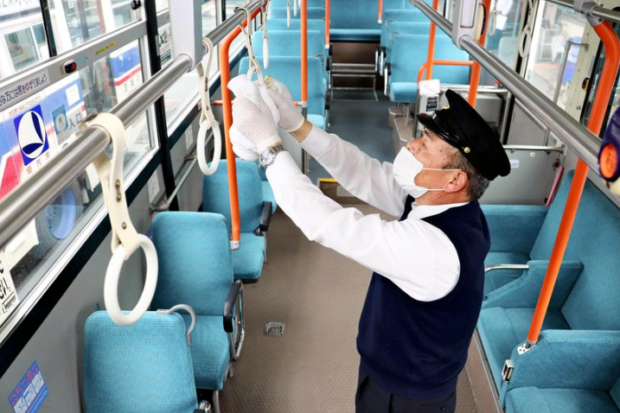Feeling unsafe, teens in Japan protest school reopenings

Local bus operators, one of the hard-hit businesses due to school closures during the coronavirus outbreak, cleans a bus in Ibaraki. The Japan News/Asia News Network
TOKYO — Most schools in Japan were temporarily closed due to the COVID-19 situation. In some areas, local governments announced the reopening of schools in early April, but some high school students took part in activities to request the extension of school closures, saying, “School restarts will spread infection.”
On April 6, the Ibaraki prefectural government started the new semester at prefectural high schools in all of its municipalities. After that, the prefectural government decided to temporarily close schools in areas where there are concerns about the spread of the infection due to frequent traffic with Tokyo, while keeping schools open in other areas.
At the prefectural Hitachi First High School in Hitachi in the northern part of the prefecture, a group of third-year students asked the prefecture to temporarily close the school and notified relevant parties that they would not attend school. From April 8 to 10, nearly 200 students did not attend school on their own volition. In response, the prefecture closed all prefectural high schools about a week later. A representative of the student group said, “I wanted them to know the situation and our thoughts.”
According to a poll conducted by a Yomiuri Junior Press reporter on the internet among first-year students in high schools and sophomores in universities in the prefecture, 76% were in favor of closing schools, 3% were opposed to it, and 21% were neither for nor against.
There are many other prefectures where similar activities were carried out by high school students.
Article continues after this advertisementIn early April in Hyogo Prefecture, students in Kobe collected more than 16,000 signatures on the internet to extend school closures.
Article continues after this advertisementWe had been thinking that adults likely regard young people as being less concerned about coronavirus countermeasures.
But the behavior of high school students gave them a slap in the face. We learned that high school students can become a driving force in society if they unite, and we were encouraged.
—Noa Nagakura is a third-year student at a high school in Ibaraki Prefecture. She is interested in international cooperation, ancient literature and idol groups and is in her school’s English club.
—Natsuki Takenaka is a second-year student at a junior high school in Tokyo. She is interested in novels, especially mysteries, and is in her school’s Japanese culture and cooking clubs.
For more news about the novel coronavirus click here.
What you need to know about Coronavirus.
For more information on COVID-19, call the DOH Hotline: (02) 86517800 local 1149/1150.
The Inquirer Foundation supports our healthcare frontliners and is still accepting cash donations to be deposited at Banco de Oro (BDO) current account #007960018860 or donate through PayMaya using this link.